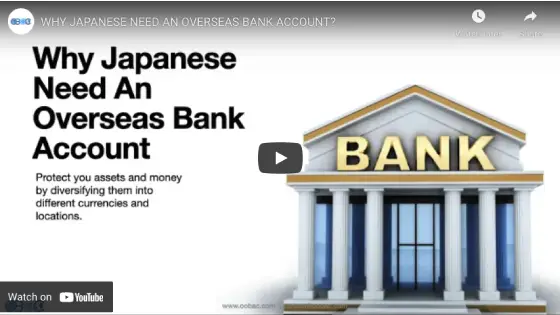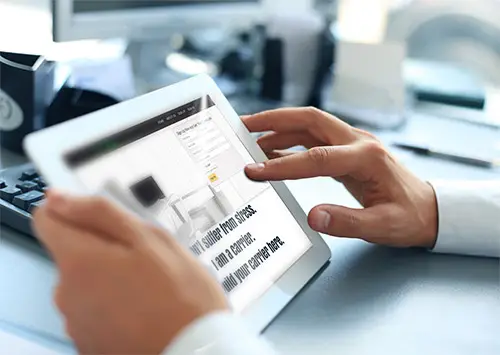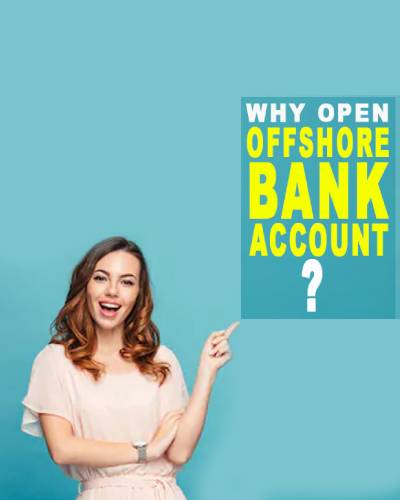Opening an Offshore bank account is the first step to protect your assets and get higher interest rates from your money.
It will help you to keep your wealth grow against unwanted circumstance caused by incapable government and sudden changes in regulation. Keeping part of your money in foreign banks gives you extra security. In addition, the banking world itself is getting more uncomfortable and scary. Unfortunately, your local banks are dramatically falling into this nightmare. According to the Tax Justice Network, an estimation of $21 to $32 Trillion of the money have already flowed to Offshore[6]. It means many other people have already tried to secure their fund. We do not suggest you hide or deposit your untaxed income in an offshore bank account. We are talking about your clean and taxed money that you kept in just one place. Think about it! With this amount of the government's debt, who will protect your money if your local bank fails. Government? Insurance? …

- What is an overseas/offshore bank account?
- Is it legal to have an account in foreign banks?
- Why we need to open offshore bank account?
- What types of bank accounts you can have?
- Personal Vs. Corporate overseas bank account
- Pseudonym bank Account with high privacy
- How many offshore bank accounts we need?
- How to choose the best offshore bank account?
- What is the best offshore bank account interest rates?
- Opening an offshore bank account for Forex (FX) related companies
- Internet Banking
- Credit Cards / Debit Cards
- How to open an offshore bank account
- how to open an offshore bank account online
- Remember this is your offshore bank account
- Certification of documents for opening bank account
- Documents required for opening bank account
- Conclusion
- References
- General FAQ

What is an overseas/offshore bank account?
An offshore bank account normally refers to an account held in a foreign offshore bank. The account can be opened in the form of a personal or business account. There is also a possibility to control multiple currencies in one account.
An offshore bank is a regulated bank that has a banking license under international banking law. They are normally offering a range of different types of accounts for individuals and corporates. Must of these accounts are checking (current) or saving accounts.
Although offshore banks are not allowed to conduct any business and investment inside the country that they are established, there are many foreign wealthy investors who are willing to use their services and open oversea bank account.
As a matter of fact, foreign banks are often offering better products and services than local banks. Some of the high profile private banks are offering investment and asset management services with a reasonable return on your investment.
Is it legal to have an account in foreign banks?
In general, having a bank account outside of your country is completely legal and normal. It will have many advantages and benefits as long as you are following your home country regulation. This is very important to check with your own country. In some countries, residents have to report their foreign assets or fund kept out of the country to their governments while other countries might not care at all.
Nowadays, people are looking for an easy and cost-efficient solution for their tax planning. Although, tax evasion is illegal and no one likes to get in trouble because of that, there are some eligible and proper ways to minimize or plan your tax. In fact, there are many ways to legally own an offshore bank account and enjoy the advantage of it without having a problem with authorities.
Why we need to open offshore bank account?
As we mentioned before, the local banks are getting unstable, insecure, and untrusted. In order to secure and protect your assets, you need to do what most powerful and experienced investors are doing. This is simple: "Not keeping all your eggs in one basket".
It is advisable to diversify your funds into different asset classes, like real state, bonds, stocks, saving in different currencies and so on. The following are some of the reasons that people tend to move their funds to an overseas bank account:
- Distrust the government, local currency, and local banks
- There are no interesting investment options in the home country
- Low-interest rates in local banks
- They need to submit many documents for a simple overseas transaction
- Investing in a foreign country needs an offshore account
Following, we will explain some of the benefits of an offshore bank account and disadvantages that opening offshore bank account can bring for you.
Advantages of offshore banking:
Avoiding local political risk diversification:
There is always a political conflict that put our assets and money into the risk. Since the government controls most of the local banks and financial institutions, the risk of keeping the asset in one place will be high. On the contrary, federal or local governments are not controlling offshore banks to freeze or seize any account. Thus, political conflicts will not affect any offshore accounts.Asset Protection:
At the time you are reading this article, you probably realize that your government is almost broken with a huge amount of debt. The history shows, in this situation, governments will not be able to pay their bills by receiving only citizens’ tax. They might plan to solve their issues with your assets. You probably know that this happened a few times in different countries like Cyprus, Poland, and Ireland. The local banks may plan to freeze your account and impose an unreasonable tax on it. What will happen if you cannot access your money? So, an overseas bank account can protect your money against your fat broken government and creditors and take your money out of their reach.Higher interest rate:
Some foreign banks are offering reasonable interest rates on their fix deposit terms. The interest rates are often starting from 3% to 15% in some banks. In addition, there are some banks that offer interest rates of 3% to 5% on foreign currencies such as USD, EUR.Multi-currency bank account:
Offshore banks normally offer multi-currency accounts. It means you can have a few different currencies in one account. Yes, you can simply exchange your British pound into EUR, USD, and JPY. It is easy to do a transaction with the currency of your choice. Keeping funds in multiple currencies is preventing the loss of assets due to foreign exchange. It is suggested not to keep all assets in one currency like the Japanese yen (JPY). As a matter of fact, foreign currencies kept in local banks is not truly considered as currency diversification. This is due to the fact that local banks will not treat them as foreign currency and you have so much limitation using them.Trading at low exchange costs
You probably know how easy could it be if you are able to send/receive funds with different currencies. For example, you are going to pay an invoice, which is provided in EUR currency. It is more convenient and cost efficient if you pay it with your EUR account instead of your JPY account.Tax advantage
In the last few years, many small, safe, and developing countries are offering very attractive corporate tax rates. Some EU countries such as Malta, Cyprus are offering very low tax rates while some offshore jurisdictions like Belize, BVI, and Seychelles are offering zero corporate tax rates. This is to attract foreign investors and business owners to bring their fund in such jurisdictions. This will help the economy of such countries grow fast. In general, such companies owned by foreigners who are living outside of these jurisdictions called the offshore company. It is also called an international business company (IBC). So, incorporating an offshore company outside of your own country and opening a corporate bank account for this company is a very attractive option for many of us.They provide a Debit card (Master/Visa card):
Most foreign banks offering debit/credit cards that can be used at any ATM around the world. Debit cards are normally provided in the form of Visa/Master cards. Some banks are offering only prepaid cards that need to be funded before using them.Easy Internet banking:
Normally, offshore banks provide simple, user-friendly, and convenient Internet banking that can be used everywhere. You can simply control your account using the Internet while living in your home country. There is no need to go to the branch office for a simple transaction.Opening account from distance:
There are many banks that offer opening bank accounts remotely. You can open your account online or through an agent without being forced to visit the bank in person. It is not necessary to go to their branch office for that. You just need to fill out the application form very carefully and send the original documents to the bank by courier. Some banks may ask for a short telephone or Skype interview.
Despite the advantages of opening a offshore bank account, there are a few disadvantages, which you need to take into account.
Disadvantages of offshore banking:
Language barrier:
English is widely used as a common language in many banks. So for some people who have difficulty to communicate in English, this might be an issue. Especially, some offshore banks such as Euro Pacific bank will not accept clients who are not able to communicate in English. In addition, some foreign banks that are offering high-interest rate providing service only on their local language, which might not be even English. Although this could bring some difficulties for communication, it is worthy to keep our fund in a safe place.Maintenance fee:
Most foreign banks apply a maintenance fee on their clients' offshore bank account. Each bank has its own fee but generally start from EUR 100 to EUR 600 annually. Some banks offer free maintenance if you can maintain a certain amount of balance that bank required.Some banks required a personal visit:
Unlike some foreign banks, most big banks still require you to visit them in their branch offices.Preparing so many documents:
Unlike your local banks, offshore banks will request more documents and evidence to perform a high-level KYC (Known Your Customer). So, you might be asked to provide many certified documents that can prof your identity and residency.Different regulation:
When you are opening an account in your home country, the regulation is almost similar among all banks. You can simply understand their law and requirements. However, this is completely different when it comes to an overseas bank. Banks are often following the law and regulation of the country that they are in. Furthermore, banks themselves have their own requirements and policies. For example, the process of an opening bank account may vary between two banks in different countries.Opening overseas bank account is time-consuming:
offshore account opening is not as easy as it was before. Nowadays, It is challenging and time-consuming. In your country, you can walk into your local bank branch and show your identity card and open account at the same time. This is due to their ability and access to check your information and documents for the purpose of AML. However, it is going to be different for the bank, which is not located in your country. There are a few procedures that you and the bank need to take before you get your account open. Because, they cannot visit you in person, they need time to verify your information and documents. Normally, the pre-approval and compliance process is time-consuming.The account is frozen:
If there is no movement on your account, the bank may freeze your account until further actions. In this situation, the account owner needs to contact the bank by phone or email and re-activate the account. In order to keep your account active, the best way is to perform at least a transaction once a while.
What types of bank accounts you can have?
There are two main types of bank account that most foreign banks offer; checking (current) account and savings account. Indeed, there are more types of accounts are available in banks and other financial institutions. The following are the most common types of bank accounts:
- Checking account (current account): this is for the people who do not care about interest and would like to have unlimited access to their account.
- Saving account: normally, the fund will remain for a long time in the account. The owner of the account has no intention to use the money every day and he/she keeps a certain amount of money as fix deposit to gain some interest. It is better to be a kind of offshore high interest saving account.
- Money market account: something between checking and savings account. You have limited access to your money and enjoying a little bit interest as well.
- Certificate of Deposit (CD): To invest as fixed deposit for a period of time and receiving interest. We suggest to find domestic or offshore banks with high interest rates.
- Individual retirement arrangement (IRA): to invest for retirement time.
- Brokerage account: To invest in stocks and bonds.

Personal Vs. Corporate overseas bank account
Personal account means an individual own a bank account for her/his personal daily needs and expenses. This account has not designed to conduct any business or trade. In addition, this type of account is not transferrable. There is another type of personal account in which two persons can open a joint account.
Indeed, opening a personal bank account is easier and faster than a corporate bank account. Furthermore, more banks are available for a personal account.
Conversely, a corporate account is designed for an entity, which is conducting some sort of businesses. The account is normally opened under an entity like business, corporation, foundation, or trust. Only authorized signatories who are selected by the board of members have access to the account.
In the case of offshore companies with a nominee, the beneficiary owners have access to the company’s bank accounts. Most foreign banks accept nominee as part of company structure and they are accepting to open an account for these companies. You just need to submit the Power of Attorney (POA) and Declaration of Trust (DOT).
Opening an overseas bank account for a company is somehow challenging. It is mostly related to the type of business the company operates. Some banks are not interested to accept high-risk activities such as digital products, adult businesses, medicines, gun and the like.
It is very important to carefully select your company structure so later you can get your bank account easier. We suggest you get advice from an experienced advisor.
Pseudonym bank Account with high privacy
It is an anonymous bank account provided for high privacy of account holder. Although, It is very difficult to get such an account nowadays, there are still a few banks that offer pseudonym bank account for personal accounts.
This is different from "Number Account". Pseudonym bank Account gives you a nickname, which is different from your real name, and you can use it as normal.
How many offshore bank accounts we need?
Well, it is a little bit difficult to say but our experience shows that one bank account may put our assets into the risk.
If you have a few bank accounts in your own country, one additional overseas bank account will be sufficient.
You may need more than one corporate bank account if you have an offshore company. For example, if you incorporate your offshore company in one jurisdiction and have a bank account in the same jurisdiction, the chance to be affected by any political issue or unexpected event is high.
So why do you want to do the same risk in another country?
So, the best is to have an alternative account for your business. This can be another bank account out the country of your company
This is a professional way to use Offshore.
How to choose the best offshore bank account?
There are many banks offering offshore accounts to their customers. However, selecting a bank which suite your needs is difficult and overwhelming. The first thing that you need to consider is the selected bank accepts your business activity and purpose of the account. Sometimes, depending on your business activity, you do not have many options for banks and you have to choose one, which accepts your application. The following factors can be considered when selecting an overseas bank:
- The political status of the country that the bank is located there is very important. It is important that a country has a stable government and has no political conflicts.
- Looking at the bank`s assets and how they are using their client’s funds.
- The liquidity of the bank
- It is important to check how financially the bank is strong. How much fund or money they are controlling.
- Do they provide Internet banking?
- How much is their maintenance fee?
- Do they offer debit or credit cards?
What is the best offshore bank account interest rates?
There are a few countries that offer best offshore bank account interest rates on their local currencies like Ukraine, Turkey, and Argentina; however, considering the inflation and currency decline against USD, they seem to be not that much interesting. The following banks are offering high-interest rates:
- Banks in Ukraine: the interest rate on local currency is around 20%; however, the inflation in Ukraine is around 49% which makes it risky for investment.
- Banks in Turkey: The economy and currency value in Turkey were not stable in recent years. Banks in Turkey offer interest rates around 15% and above on their local currency.
- Banks in Mongolia: Mongolian banks offer 14+% interest rates on their local currency and 4% - 5% on USD accounts; however, opening offshore bank account in Mongolia is not easy.
- Banks in Georgia: As of this writing, Georgia is known as the easiest country to open offshore bank account. They also offer 9+% interest rates on their local currency and some banks offer interest on USD as well.
- Banks in Cambodia: Cambodian banks offer 6.5% to 7.25 % on Cambodia Riel and 4% to 5% on USD for one year term.
- Banks in Azerbaijan: There are banks in this country that offer an interest rate of 3% on USD accounts.
- Banks in Malaysia: Malaysian local banks normally offer between 1.2% and 3.5% interest rates on their local currency (Malaysia Ringgit) based on the terms of deposit.
- Belize Banks: Banks in Belize offer an interest rate of about 2.54%. Considering Its very low inflation (almost 0%), Belize banks offer good interest rates.
Opening an offshore bank account for Forex (FX) related companies
Nowadays, there are more Japanese people investing in Forex (Fx) trading. Due to the high tax and high risk and also the limitations and restrictions inside Japan, many investors invested their money in foreign Forex companies outside Japan. Some companies are developing their own Forex (Fx) related software and platform and they would like to offer their business outside Japan. So, how to open a offshore bank account for Forex or Fx related activities?
We have to understand; there are only a few banks that open offshore bank account for Japanese who want to do Fx trading. From the bank perspective, there is a big difference between the one who only trade with his/her own fund and the one who is intending to provide Forex services. Please note that opening account for Fx trading is not easy and time-consuming. Most banks are only accepting clients who are trading with their own fund. So, it is not possible to open bank account if you are going to gather your friends or clients money and then do Fx trading. You will not be able to give their profit with the same account. In fact, you need a valid license if you are going to provide services like MAM, asset management, and investment in Forex trading. Banks only accept such application with the related license.
3 perfect way to get a bank account for your forex trading
Internet Banking

Internet banking or online banking is a method that transactions are managed through the Internet. This is the best way to control your overseas bank account from home. It is really hard and time-consuming to go to the branch for a single transaction. Online banking will support almost all services that you can get in your local branch.
In general, almost all foreign banks utilize an Internet banking system. They are simple and easy to use. You can simply send or receive money from your offshore bank account.
Credit Cards / Debit Cards
Most offshore banks provide debit cards that can be used at any ATM around the world. The fee will be different from bank to bank and you need to check their fee before you order any card. Some banks have monthly fees while others charge on transactions.
In addition to the debit card, some banks are offering credit card too. The credit cards offered by foreign banks usually have specific terms of use and limitation. They often offer different types of credit cards and you can order after you get your bank account.
Types of cards vary between banks. Please check with your bank for more information.
How to open an offshore bank account
- You can open an offshore account by yourself
It is possible to open a bank account by yourself. It is similar to what you are doing in your home country. Many banks accept your application if you walk into any of their branches, provide them the documents and fill the application forms. Furthermore, some banks are offering an online registration and you can send your documents by mail. Although it is possible to open an account remotely, you need to be very careful with a single word you are giving to the bank.
A lot of applications were rejected because of a single mistake or improper information provided to the bank during the registration process.
The procedures and regulations for opening bank account vary between foreign banks. Some banks are requiring a pre-approval form to be submitted before submitting any actual documents. They will study and evaluate your application first and upon acceptance, they will collect your actual documents. However, some banks require you to provide them a full set of documents and application format first stage.
In conclusion, opening an offshore account is not as difficult as it looks. You just provide information that the bank needs. - Through an experienced agent / oobac
We suggest you get an experienced service provider who can assist you in the opening bank account if you are not familiar with bank application forms. They have a close relationship with most overseas banks and they know the requirements of banks. They can help you to get your account easier and faster.Please contact us if you need to open an offshore bank account.
how to open an offshore bank account online
Recently, most banks offer online opening bank accounts. You can open your account through their website without being forced to visit the bank in person. It is not necessary to go to their branch office for that. You just need to fill out the application form very carefully and send the original documents to the bank by courier. Some banks even accept the digital copy of your documents. Banks may ask for a short telephone or Skype interview.
There are a few banks or payment institutions that allow you to open offshore bank account online free. At the moment, it is possible to open a Swiss bank account online or get a trasferwise account for free. Some banks like Euro Pacific banks in Puerto Rico or bank frick allow you to open bank account online for free, but keeping the account is not free and you need to pay the maintenance fee and deposit an initial deposit.
Please contact us if you need any help regarding these banks.
Remember this is your offshore bank account
This is your bank account and nobody should have access to your account except you. You must make sure that you have full access to your account if you are opening an account through an agent or using nominee services.
We at Oobac will handle all process of opening bank account such as preparing application forms, checking the documents, certifying documents (for some banks only), submitting the application forms, and communicating with the bank till your account is opened. From this point onward, you are the only person who has access to the account and dealing with the bank directly.
Certification of documents for opening bank account
In general, since most of the process of opening a bank account is done remotely, the banks will require you to submit a certified true copy of your documents. The documents can be certified by an authorized agency such as a public notary, a lawyer, registered auditor or an accountant.
Some foreign banks may prefer an "apostilles" stamp. This is an international certification, which you need to get from an authorized center assigned by the government.
Please contact us if you need more information about how to certify your documents.
Documents required for opening bank account
Each foreign country has its own regulation and requirements. Thus, banks in each country have to follow the regulation defined by the government and the central bank of the country. On top of that, some banks may require more documents and information.
The Basic Requirements
The basic information and documents are similar to the one you give to your bank in your home country. In general, for a personal bank account, they required your personal information such as name, address and contact information while for a corporate account they will ask for company information as well as directors and shareholders personal information. The following are basic information and documents that a bank might ask:Requirements to open personal offshore bank account:
- A copy of your identity documents: a copy of your ID card issued by the government or a copy of your passport. This is to verify your personal information.
- A copy of proof of address: It can be any utility bill such as TV, Electricity, Tel, and Water bill that is under your name. This is to verify your physical address since it is very important for the tax and further communications.
- CV (resume)
- Signed bank application form: this is a standard form designed and provided by the bank which you need to fill out the required information, sign and send the copy or original to the bank.
Corporate bank account information and documents:
- A copy of proof of identity- for all directors, nominees, officers, shareholders, beneficiary owners, and account signatories.
- A copy of proof of address- for all directors, nominees, officers, shareholders, beneficiary owners, and account signatories.
- CV (Resume)-for all directors, nominees, officers, shareholders, beneficiary owners, and account signatories.
- Certificate of incorporation (COI).
- Memorandum and Articles of Association (MAA)
- Register of Directors and Shareholders
- Company resolution for a bank account.
- Share certificate.
- Business plan or an explanation of business activity in detail.
- Signed bank form.
Additional Verification Documents
While the basic documents and information are similar between banks, they may ask for some more documents and information. The following are documents you might need to prepare:- Employment letter/ Salary slip: this is to verify your current occupation and incomes. Generally, it should include the date of your employment, duration, and salary.
- Financial reference letter: it must be taken from your current bank, indicating average balances, and duration and satisfactory of relationship.
- Financial history/bank statement: some banks may ask you to provide them your bank statements for the last six to 12 months.
- Investment contract: if your initial fund coming from an investment income.
Conclusion
As a result, opening an offshore bank account is necessary if you are keeping all your assets in your local banks. The advantage of this account is so much more than its disadvantages. It will protect your assets against unwanted circumstance. However, we suggest not putting all your assets in one foreign bank account.
Some people hire a nominee for their privacy and confidentiality. We strongly suggest that the beneficiary owner of the company should have full control of the company's account. It is advisable to inform the bank about the nominee and let them know who is the real owner. We do not suggest opening account under nominee in order to hide your identity. It may bring you another issue in the future.
We are always here to assist you if you need our help.
References
General FAQ
What is an offshore account?
An offshore bank account normally refers to an account held in a foreign offshore bank. Generally, somewhere outside of your country. The account can be opened in the form of a personal or business account. There is also a possibility to control multiple currencies in one account.
What are the best countries to open offshore bank account?
There is no specific country that can be considered as the best country to open an offshore bank account. This is completely related to your aim and purpose of the account. For example, Puerto Rico is one of the best countries to have account if you are looking for non-CRS jurisdiction. In general, for offshore companies banks in Mauritius, St Lucia, Puerto Rico, BVI, and Belize are more open to accept the bank account. Indeed, the Republic Of Georgia is the easiest country to open an offshore bank account if you can travel there. The Cayman Islands is the best country for tax benefits and Switzerland for asset protection. Liechtenstein and Singapore are the best countries for wealthy people.
Can I open an offshore bank account online?
Yes, many offshore banks offer online bank account opening procedure; however, to fill out their application forms and respond to their questions required experience and basic banking knowledge. Wrong answers let your application get rejected.



